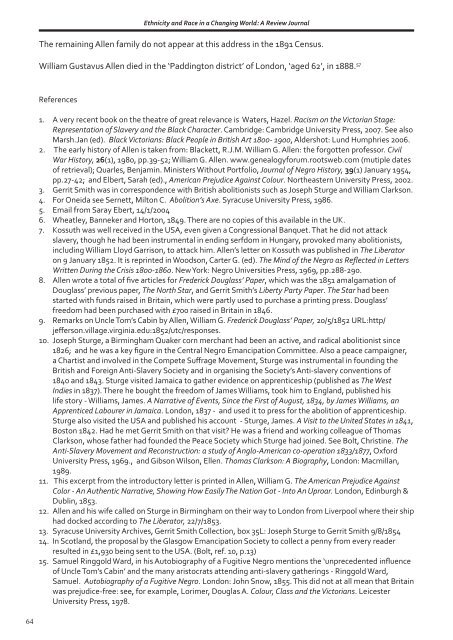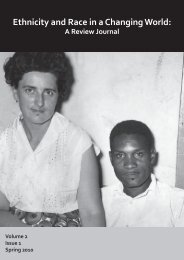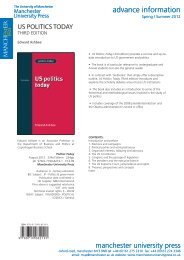Ethnicity and Race in a Changing World
Volume 2, Issue 1, 2011 - Manchester University Press
Volume 2, Issue 1, 2011 - Manchester University Press
You also want an ePaper? Increase the reach of your titles
YUMPU automatically turns print PDFs into web optimized ePapers that Google loves.
<strong>Ethnicity</strong> <strong>and</strong> <strong>Race</strong> <strong>in</strong> a Chang<strong>in</strong>g <strong>World</strong>: A Review JournalThe rema<strong>in</strong><strong>in</strong>g Allen family do not appear at this address <strong>in</strong> the 1891 Census.William Gustavus Allen died <strong>in</strong> the ‘Padd<strong>in</strong>gton district’ of London, ‘aged 62’, <strong>in</strong> 1888. 57References1. A very recent book on the theatre of great relevance is Waters, Hazel. Racism on the Victorian Stage:Representation of Slavery <strong>and</strong> the Black Character. Cambridge: Cambridge University Press, 2007. See alsoMarsh.Jan (ed). Black Victorians: Black People <strong>in</strong> British Art 1800- 1900, Aldershot: Lund Humphries 2006.2. The early history of Allen is taken from: Blackett, R.J.M. William G. Allen: the forgotten professor. CivilWar History, 26(1), 1980, pp.39-52; William G. Allen. www.genealogyforum.rootsweb.com (mutiple datesof retrieval); Quarles, Benjam<strong>in</strong>. M<strong>in</strong>isters Without Portfolio, Journal of Negro History, 39(1) January 1954,pp.27-42; <strong>and</strong> Elbert, Sarah (ed)., American Prejudice Aga<strong>in</strong>st Colour. Northeastern University Press, 2002.3. Gerrit Smith was <strong>in</strong> correspondence with British abolitionists such as Joseph Sturge <strong>and</strong> William Clarkson.4. For Oneida see Sernett, Milton C. Abolition’s Axe. Syracuse University Press, 1986.5. Email from Saray Ebert, 14/1/20046. Wheatley, Banneker <strong>and</strong> Horton, 1849. There are no copies of this available <strong>in</strong> the UK.7. Kossuth was well received <strong>in</strong> the USA, even given a Congressional Banquet. That he did not attackslavery, though he had been <strong>in</strong>strumental <strong>in</strong> end<strong>in</strong>g serfdom <strong>in</strong> Hungary, provoked many abolitionists,<strong>in</strong>clud<strong>in</strong>g William Lloyd Garrison, to attack him. Allen’s letter on Kossuth was published <strong>in</strong> The Liberatoron 9 January 1852. It is repr<strong>in</strong>ted <strong>in</strong> Woodson, Carter G. (ed). The M<strong>in</strong>d of the Negro as Reflected <strong>in</strong> LettersWritten Dur<strong>in</strong>g the Crisis 1800-1860. New York: Negro Universities Press, 1969, pp.288-290.8. Allen wrote a total of five articles for Frederick Douglass’ Paper, which was the 1851 amalgamation ofDouglass’ previous paper, The North Star, <strong>and</strong> Gerrit Smith’s Liberty Party Paper. The Star had beenstarted with funds raised <strong>in</strong> Brita<strong>in</strong>, which were partly used to purchase a pr<strong>in</strong>t<strong>in</strong>g press. Douglass’freedom had been purchased with £700 raised <strong>in</strong> Brita<strong>in</strong> <strong>in</strong> 1846.9. Remarks on Uncle Tom’s Cab<strong>in</strong> by Allen, William G. Frederick Douglass’ Paper, 20/5/1852 URL:http/jefferson.village.virg<strong>in</strong>ia.edu:1852/utc/responses.10. Joseph Sturge, a Birm<strong>in</strong>gham Quaker corn merchant had been an active, <strong>and</strong> radical abolitionist s<strong>in</strong>ce1826; <strong>and</strong> he was a key figure <strong>in</strong> the Central Negro Emancipation Committee. Also a peace campaigner,a Chartist <strong>and</strong> <strong>in</strong>volved <strong>in</strong> the Compete Suffrage Movement, Sturge was <strong>in</strong>strumental <strong>in</strong> found<strong>in</strong>g theBritish <strong>and</strong> Foreign Anti-Slavery Society <strong>and</strong> <strong>in</strong> organis<strong>in</strong>g the Society’s Anti-slavery conventions of1840 <strong>and</strong> 1843. Sturge visited Jamaica to gather evidence on apprenticeship (published as The WestIndies <strong>in</strong> 1837). There he bought the freedom of James Williams, took him to Engl<strong>and</strong>, published hislife story - Williams, James. A Narrative of Events, S<strong>in</strong>ce the First of August, 1834, by James Williams, anApprenticed Labourer <strong>in</strong> Jamaica. London, 1837 - <strong>and</strong> used it to press for the abolition of apprenticeship.Sturge also visited the USA <strong>and</strong> published his account - Sturge, James. A Visit to the United States <strong>in</strong> 1841,Boston 1842. Had he met Gerrit Smith on that visit? He was a friend <strong>and</strong> work<strong>in</strong>g colleague of ThomasClarkson, whose father had founded the Peace Society which Sturge had jo<strong>in</strong>ed. See Bolt, Christ<strong>in</strong>e. TheAnti-Slavery Movement <strong>and</strong> Reconstruction: a study of Anglo-American co-operation 1833/1877, OxfordUniversity Press, 1969., <strong>and</strong> Gibson Wilson, Ellen. Thomas Clarkson: A Biography, London: Macmillan,1989.11. This excerpt from the <strong>in</strong>troductory letter is pr<strong>in</strong>ted <strong>in</strong> Allen, William G. The American Prejudice Aga<strong>in</strong>stColor - An Authentic Narrative, Show<strong>in</strong>g How Easily The Nation Got - Into An Uproar. London, Ed<strong>in</strong>burgh &Dubl<strong>in</strong>, 1853.12. Allen <strong>and</strong> his wife called on Sturge <strong>in</strong> Birm<strong>in</strong>gham on their way to London from Liverpool where their shiphad docked accord<strong>in</strong>g to The Liberator, 22/7/1853.13. Syracuse University Archives, Gerrit Smith Collection, box 35L: Joseph Sturge to Gerrit Smith 9/8/185414. In Scotl<strong>and</strong>, the proposal by the Glasgow Emancipation Society to collect a penny from every readerresulted <strong>in</strong> £1,930 be<strong>in</strong>g sent to the USA. (Bolt, ref. 10, p.13)15. Samuel R<strong>in</strong>ggold Ward, <strong>in</strong> his Autobiography of a Fugitive Negro mentions the ‘unprecedented <strong>in</strong>fluenceof Uncle Tom’s Cab<strong>in</strong>’ <strong>and</strong> the many aristocrats attend<strong>in</strong>g anti-slavery gather<strong>in</strong>gs - R<strong>in</strong>ggold Ward,Samuel. Autobiography of a Fugitive Negro. London: John Snow, 1855. This did not at all mean that Brita<strong>in</strong>was prejudice-free: see, for example, Lorimer, Douglas A. Colour, Class <strong>and</strong> the Victorians. LeicesterUniversity Press, 1978.64






